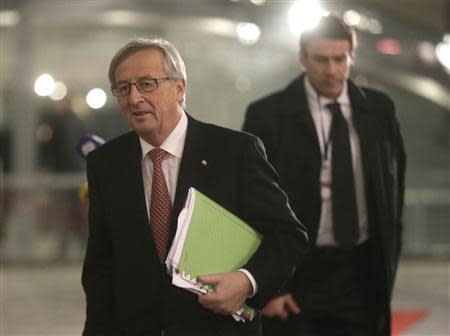Merkel backs Juncker to lead conservatives in EU elections

By Gernot Heller BERLIN (Reuters) - German Chancellor Angela Merkel threw her weight behind Luxembourg's Jean-Claude Juncker on Thursday as the leading conservative candidate in May's European Parliament elections, a potential springboard to head the European Commission. It was her first public endorsement of the veteran former prime minister and ex-chairman of euro zone finance ministers and it appeared to dim the prospects of French European Commissioner Michel Barnier, the only other declared candidate. As leader of Europe's biggest economy and most powerful conservative party, Merkel wields strong influence in the centre-right European People's Party (EPP). "It is no secret that I have a lot of sympathy for Jean-Claude Juncker," she said at a joint news conference with new Luxembourg Prime Minister Xavier Bettel, who ousted Juncker after a general election last October. While stopping short of explicitly backing Juncker to head the EU executive, the chancellor said the immediate task was to find someone to lead European conservatives in the elections who could move up to become Commission president. Merkel added that support from his own country was a "very important message". "If Mr Juncker can become Commission president, we will support this candidacy," Bettel told reporters. A new Commission chief, in charge of proposing and enforcing regulations for some 500 million Europeans, will take office for five years from November, succeeding Portugal's Jose Manuel Barroso who has led the institution since 2004. The centre-right EPP, the largest political grouping in the outgoing 766-seat parliament, will chose its leading candidate at a congress in Dublin on March 6-7. The Socialists and Democrats, the second-largest group, have already selected Germany's Martin Schulz, the current president of the European Parliament, as their candidate. The third biggest bloc, ALDE, the alliance of Europe's Liberal parties, has chosen Guy Verhofstadt, a former Belgian prime minister, as its candidate for Commission chief. Whichever group wins the most seats in the May 22-25 elections is expected to lay claim to the Commission presidency, although it is EU leaders who propose a candidate under treaty rules, and parliament votes on their nominee. The European legislature has gained an expanded role in policy making under the 2009 Lisbon treaty. Juncker, who was prime minister for 19 years, is a European federalist who wants a bigger say for the Commission. He was a key broker in Europe's debt crisis, leading the Eurogroup of euro zone finance ministers until early last year. However, his reputation has been tarnished by a spying scandal in Luxembourg and his Eurogroup successor, Dutch Finance Minister Jeroen Dijsselbloem, told Dutch TV last month that Juncker drank and smoked heavily during crisis meetings. "I would like to be asked about politics and not about my alcohol problem which I don't have," Juncker responded in Germany's Der Spiegel magazine this week. His coalition government collapsed last year when the Socialists quit, blaming him for failing to curb abuses of power by the secret service. (Writing by Madeline Chambers; Editing by Paul Taylor)

